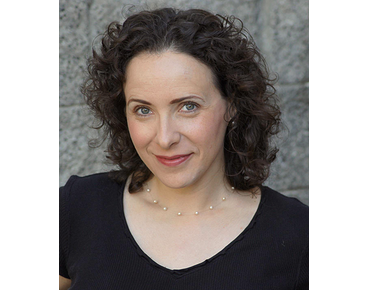Libby Fischer Hellmann's Blog, page 16
September 23, 2016
Easy Innocence is FREE!
Just a reminder — EASY INNOCENCE is FREE when you visit my website. Take a look:
With over 150 4 and 5 star reviews, Easy Innocence is also one of the top rated mysteries on Wattpad.It’s available in print and audio as well.
Just click here. Would love to connect with you.
The post Easy Innocence is FREE! appeared first on .
September 18, 2016
Murder on the Quai — The Backstory, with Cara Black & Aimee LeDuc
Aimée Leduc is a chic, no-nonsense Paris-based PI and heroine of 15 mysteries, by Cara Black, a New York Times bestselling author. In June Cara released Murder on the Quai, a prequel revealing how Aimée first became a detective. Cara has won multiple nominations for the Anthony and Macavity Awards, a Washington Post Book World Book of the Year citation, the Médaille de la Ville de Paris and more, and has more than 400,000 books in print. Earlier this year I talked to Cara on my Second Sunday Crime show.
Murder on the Quai – The Backstory
The book is set in 1989, the year of the big San Francisco earthquake (that’s where Cara lives) and the year the Berlin Wall finally came down. Aimee is a young student struggling with her PreMed college program, a tough landscape where just 25% of pupils make it through to the second year… and someone is trying to sabotage her in class.
Russia is falling apart, it’s the last gasp of the Cold War, and Aimee’s father is on his way from Paris to Berlin to get vital files about Aimee’s mother out of the Eastern Bloc before the East German police, the Stasi, can sell them to the highest bidder in an effort to save their own necks.
We (finally) get more backstory on Aimee’s parents. Her dad was a police officer, a beat cop who met Aimee’s mother when policing a demonstration. They fell in love. He was accused of corruption, and she left to become an Eastern European radical. Her parents were only together for 8 years before the shit hit the fan – a bad boy and an equally bad boy brought together by a magnetic attraction.
Research and Field Trips
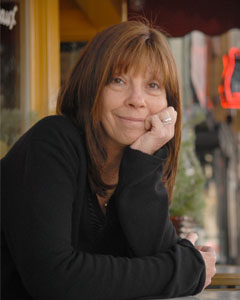 The attention to detail given to history in Cara’s novels makes them particularly true to the times, and Cara has always wanted to write about the chaotic days after the Berlin Wall fell. She was in Berlin at the time, and saw the drama in real life. She was even hauled in by the Stasi in East Berlin, before the wall fell, for photographing the scenery with a Brownie camera and was questioned for several hours. Three years ago she returned to the city and stayed in the former East Berlin, an emotional experience, especially when walking through the Brandenburg Gate, which for years sat in no-man’s land, trapped between East and West. It was an incredible and moving experience, something she never thought she’d see in her lifetime.
The attention to detail given to history in Cara’s novels makes them particularly true to the times, and Cara has always wanted to write about the chaotic days after the Berlin Wall fell. She was in Berlin at the time, and saw the drama in real life. She was even hauled in by the Stasi in East Berlin, before the wall fell, for photographing the scenery with a Brownie camera and was questioned for several hours. Three years ago she returned to the city and stayed in the former East Berlin, an emotional experience, especially when walking through the Brandenburg Gate, which for years sat in no-man’s land, trapped between East and West. It was an incredible and moving experience, something she never thought she’d see in her lifetime.
Back to Aimee. When her dad died she gave up on medicine and took over his detective agency, training as a PI. The book explains how it happened. We meet Aimee’s granddad Claude, who played a part in raising her after her mom left, and Cara fell in love with the character. Claude is a fine cook and bon vivant who adores his granddaughter. The character is made up from all sorts of people who were influential in the author’s life, including her own grandfather. He believed we should always do what we love, and he inspired her to write. She just wishes he had lived long enough to see her books in print.
Finding The Plot
There’s a mystery within the new book, and a strange World War Two story inspired it. Cara went to visit a neighbor from San Francisco, who was living in France, whose parents were Parisian. During a visit to the countryside, to the village where her friend’s dad had grown up, the old man revealed a grisly secret, something he hadn’t told the family. Apparently when he was small, during the war, he could hear the German soldiers talking just over the river that marked the line between Vichy and occupied France in 1939 to ’42. And that’s where it happened. He found a man shot to death on the riverbank, a man from the village. Did the Germans or the French Resistance kill him? He didn’t know. But he knew one thing… the killer was still alive, living in a château, having done very well for himself, and there were rumors about his wealth coming from a stolen haul of purloined Nazi gold.
Cara never forgot the story, and she wanted to write it into one of her Aimee books, to play with the idea of the secrets kept by an entire village for more than fifty years. So she manufactured a story based on the shocking things she’d heard, changed the name of the village, did lots of fact-checking, researched the old WW2 demarcation lines and checkpoints, and found photos of the time.
Now… how did Aimee get involved in detective work? A distant family member came to her dad’s office, who had met Aimee as a child. Aimee has always longed for information about her mother. When Aimee called the woman, it led to the discovery of a pile of lost Nazi gold stolen from the French. The Germans needed titanium, which was mined in Portugal, to armor-plate their tanks and take on the might of Russia. So they made a deal with the Portugese dictator to swap titanium for gold.
Where there’s gold, everybody wants a piece of the pie. As Balzac said, behind every fortune is a giant crime. The resulting book combines real life events with fiction, taking a true story and reworking it to see how things might happen a different way.
Cara loves the research process, which included talks to a French policeman working in Vice, a visit to the Champs Elysee nightclubs where the 1980s Jet Set went, places that are still run by the mob. The Golden Triangle is the wealthiest part of Paris, the perfect place for newly-wealthy people whose riches are highly suspect. While there, Cara was stumbling around one day and found a bookshop full of hunting books. The shop was established in 1946, and it struck her as the perfect way to launder dodgy money. The rest is history – it’s fiction, but at the same time it’s “plausible.”
Of course, I personally am entranced, since WW2 resonates so strongly with me. If you haven’t already read it, put Murder on the Quai on the top of your list! To listen to the actual show, just click here.
The post Murder on the Quai — The Backstory, with Cara Black & Aimee LeDuc appeared first on .
September 7, 2016
Kent Krueger Talks About Writing
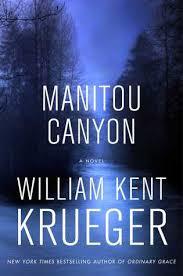 Eighteen months ago I interviewed my good friend William Kent Krueger on my Second Sunday Crime radio show —actually it was the show premiere. At the time he’d just started writing his 15th Cork O’Connor novel. It’s now been released. It’s called Manitou Canyon, so now seems like the perfect time to delve into what Kent and I discussed then.
Eighteen months ago I interviewed my good friend William Kent Krueger on my Second Sunday Crime radio show —actually it was the show premiere. At the time he’d just started writing his 15th Cork O’Connor novel. It’s now been released. It’s called Manitou Canyon, so now seems like the perfect time to delve into what Kent and I discussed then.
A conversation with William Kent Krueger
It’s always interesting talking writer to writer. We’re all so different. How did Kent feel about the remarkable clean sweep he made with his stand-alone bestseller Ordinary 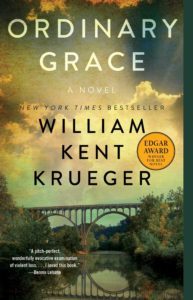 Grace? It won the Edgar, the Anthony, Macavity, and Barry for Best Novel, as well as the Midwest Booksellers Best Fiction award, the Goodreads Best Mystery & Thriller award, and the Dilys. Ever modest, he hopes his best is still to come, but he was gratified that the book touched so many people.
Grace? It won the Edgar, the Anthony, Macavity, and Barry for Best Novel, as well as the Midwest Booksellers Best Fiction award, the Goodreads Best Mystery & Thriller award, and the Dilys. Ever modest, he hopes his best is still to come, but he was gratified that the book touched so many people.
As far as his NYTimes best-selling Cork O’Connor mysteries are concerned, Kent is still discovering things about the character after more than 20 years of writing him. But Ordinary Grace let him do something wholly different. Set in Southern Minnesota during the summer of 1961, it’s about a Methodist minister whose child is murdered. But it’s really about what the tragedy does to his family, his faith, and the town.
How about the writing process itself? I struggle. It’s the most difficult thing in my life. I’d rather do anything than start writing, and I do everything I can to put it off because it’s so hard. Kent, on the other hand, can’t wait to get up in the morning and start writing. It’s a labor of love for him. Even when it’s difficult, he’s steeped in the beauty of language and deeply involved in a struggle to help readers share his vision. It’s magical having a book accepted. It’s amazing when it gets published. But it’s the process of writing, the magic of words, that he loves best of all.
What comes first – language, character or plot,? It’s typically the emotion – Kent is concerned with what he wants readers to feel in the often horrific situations he puts them in. He wants them to experience the shock and know the profound sense of the wrongness of a situation. He wants them to close the book and be terribly disturbed.
What about creating a paragraph. Does he focus on language, dialogue, internal monologue, all of them, or does he get it all out then go back and add elements later? In his experience the most important thing of all is that every paragraph, page, line, sentence and chapter has to move the story forward. You need to make a series of judicious choices about the right words in the right order, the right rhythm and pace. After twenty years as a writer you get a strong sense of how to draw on the most powerful and effective language. You have the speed you need to swiftly accomplish it. And the emotional side of things flows too. .
Does Kent ever get writer’s block? Apparently, no. Never. Sometimes things don’t turn out right the first time. Take, Manitou Canyon. He quite liked the first two chapters but they didn’t have any excitement or pizazz. He had a new idea about how to open the book, so went back and rewrote it.
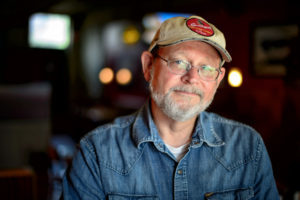 When did he know he wanted to be a writer? Always. As far as Kent can remember he was always telling stories, mostly to himself. And it was a long apprenticeship – he was almost 50 years old when he published his first novel, but he always knew he didn’t want to do a job that sucked all energy out of him and left no space for creativity. For a few years he ran a scientific research lab, but the desire to be a writer never went away. He was always writing short stories, got a few published, had a go at journalism… but hated the editing, where you had to get rid of 1000’s of words for no other reason than a piece was ‘too long’.
When did he know he wanted to be a writer? Always. As far as Kent can remember he was always telling stories, mostly to himself. And it was a long apprenticeship – he was almost 50 years old when he published his first novel, but he always knew he didn’t want to do a job that sucked all energy out of him and left no space for creativity. For a few years he ran a scientific research lab, but the desire to be a writer never went away. He was always writing short stories, got a few published, had a go at journalism… but hated the editing, where you had to get rid of 1000’s of words for no other reason than a piece was ‘too long’.
Like many writers he suffered from a desire to write the next Great American Novel. And like most writers, it never happened. He has always loved Ernest Hemingway, read him when he was eighteen years old and fell in love with him. He spent a long and fruitless period trying to write Great Literature, with capitals. Tried to structure stories like Hemingway, which was a pretty stupid endeavor since Hemingway did it so much better. It was his mid life crisis that led him to write something someone might actually read, a mystery novel. But he was a slow starter there as well, since he never read many mysteries. He had to learn the structure, pacing, and suspense from scratch. Luckily he was a quick study.
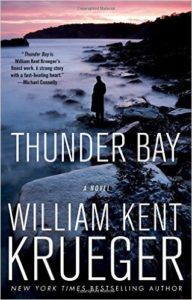 Kent’s favorite Cork book is number seven in the series, Thunder Bay, partly because it’s the only one he’s written partly in first person narrative. Cork tells the story, and he feels he captured his protagonist’s voice pretty well.
Kent’s favorite Cork book is number seven in the series, Thunder Bay, partly because it’s the only one he’s written partly in first person narrative. Cork tells the story, and he feels he captured his protagonist’s voice pretty well.
What does he find the hardest part of writing mysteries? It’s the plot, which takes more time than any other aspect. The skeleton must be solid, the motivations in place. Plot has to be believable all the way through, as does every character, what they do and why. Then there’s the essential literary sleight of hand, where you lay out elements for reader to solve, but also have to misdirect them to keep the interest and intrigue going.
If he could start over, what would he do differently? Just one thing: give the town the Cork books are set in a different name. The town’s called Aurora, it’s a real town, but the actual place is nothing like its fictional namesake. Which confuses the hell out of readers and fans who visit the place.
How does Kent feel about authors who are asked by a dead writer’s Estate to create more books? He can understand that people might not want the character to end when an author dies, but he has reservations. How about very famous writers hiring other authors to write their books? Again he can understand it, when they’re fine authors in their own right, but why, as a reader, would you buy a book that wasn’t written by the author they love?
Does he have any advice for aspiring crime writers, knowing the state of the publishing market today? That’s simple: graduate from college, get a job that pays the rent and medical insurance first! Write because it’s what you love to do, whether you’re published or not. Don’t let criticism and failure throw you or deter you. Hang in there. Be true to that, and you’ll write the stories you were always meant to write.
What’s Manitou Canyon about? The story goes like this. When he’s tasked with finding a missing man in Minnesota’s Boundary Waters Canoe Area Wilderness, Cork is far from confident. He ends up vanishing into the vast wilderness himself, and in the end it’s his family who unravel the mystery of the two disappearances. But there’s more. Cork’s fate, and that of hundreds of innocent folk, are also at stake.
Sound good? Grab a copy and let me know what you think…
The post Kent Krueger Talks About Writing appeared first on .
August 31, 2016
Publishing in 2016: It Isn’t All Roses For Anyone

There’s a lot of talk about the death of traditional publishers, but things aren’t exactly coming up roses on the indie publishing side either. Authors find themselves between a rock and a hard place, at the mercy of a fast-changing market, none of whose players seem to know which way to turn or which direction to follow. The result is an increasingly rocky ride for all authors, indie and otherwise.
Traditional book publishers lurch from crisis to crisis
These days traditional publishers often limit authors to a mean-spirited 10% royalty for print sales and a better but still mean 25% for ebooks and audiobooks. Which means you have so sell a hell of a lot of books to make a success of a writing career.
In fact, traditional publishers call selling 5000 books a success. You can earn a place on the Wall Street Journal bestseller list with sales of just 3000 books, and the once-prestigious New York Times bestseller list with as few as 2000 sales, against a backdrop where many authors sell fewer than 500 books.
Selling 5000 copies of a book at a 10% royalty is no way to make a living. At (roughly) $25 per copy, you’ll make $12,500. If you want to make thirty grand a year you’ll need to sell 15,000 books through a traditional publisher, and a sixty grand salary would demand 25,000 sales. It isn’t sustainable for an author, and hardly so for a publisher.
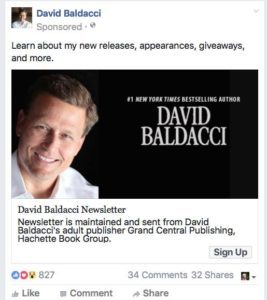
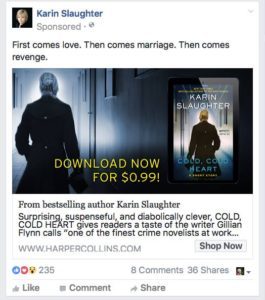 In fact, Penguin-Random House, the largest of the Big 5, saw a double digit decline of 10% in sales and earnings for the 1st 6 months of 2016! Maybe that’s why we’re beginning to see Facebook ads for the likes of Karin Slaughter and David Baldacci. What used to be the sole terrain of indie authors is now being invaded by traditionally pubbed authors, desperate to keep their sales up.
In fact, Penguin-Random House, the largest of the Big 5, saw a double digit decline of 10% in sales and earnings for the 1st 6 months of 2016! Maybe that’s why we’re beginning to see Facebook ads for the likes of Karin Slaughter and David Baldacci. What used to be the sole terrain of indie authors is now being invaded by traditionally pubbed authors, desperate to keep their sales up.
But the indie author has his/her own woes.
The changing face of Amazon
Take Amazon. Their legendary customer review system used to make it easy for readers to find best-sellers, with the books people enjoyed the most automatically appearing on the bestseller list. Simple. But back in May 2015 the retailer took the Best Sellers category off the drop down menu.
These days buyers can sort books by relevance, price, customer reviews and new arrivals, but no longer “Best-Sellers.” When you search categories, best-sellers don’t pop up automatically either – you get ‘featured’ books instead. There you can sort by best sellers, but the process is far less intuitive and not anywhere near as user-friendly as it was. And while writers like me might hit the number one slot in several categories, our Kindle books aren’t visible to people via organic search. Does it matter? Read on.
Experimenting with Amazon organic search
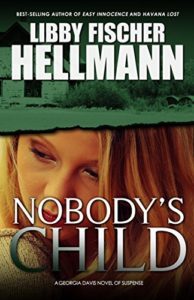
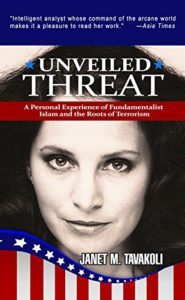 My friend Janet Tavakoli and I have been experimenting with Amazon. The full story is on the Huffington Post website , but here’s a short version.
My friend Janet Tavakoli and I have been experimenting with Amazon. The full story is on the Huffington Post website , but here’s a short version.
Janet ran a promotion for the Kindle edition of her excellent nonfiction memoir, Unveiled Threat: A Personal Experience of Fundamentalist Islam and the Roots of Terrorism.At the same time I ran a broader promotion for my award-winning thriller Nobody’s Child. Here’s what happened:
Unveiled Threat got an Amazon rank of 1900, number one in Kindle Store > Kindle eBooks> Religion & Spirituality > Islam section
Nobody’s Child got an Amazon rank of 100 and hit number five in Kindle Store > Kindle eBooks > Mystery, Thriller & Suspense > Mystery > Private Investigators
Because Amazon now delivers ‘featured’ Kindle books instead of bestsellers, when Janet cleared her browser and tried to track these categories down on Amazon, she failed. She couldn’t find either Kindle book, simply because you can’t see the genuine bestsellers in a category unless you specifically ask for them. For my book Nobody’s Child that would mean clicking through Kindle Store to Kindle eBooks, then finding the bestsellers link and clicking through to Mystery, Thriller & Suspense > Mystery > Private Investigators. A long journey, and not one that comes naturally.
Indie authors fleeing Amazon for alternative pastures
Authors like us helped make Kindle a success with low-cost, highly popular ebook content. Now, though, Amazon customers can’t find our books organically, unless they make a big and hopelessly counter-intuitive effort. Ultimately, this means we may be less inclined to stick with Amazon, as we once did. More indie writers than ever are listing their eBooks with Amazon’s competitors.
Amazon has been very good to me in the past, but I can’t help wondering if this is one of the shots across the bow we’ve been fearing. What else is on the horizon?
The post Publishing in 2016: It Isn’t All Roses For Anyone appeared first on .
August 24, 2016
Getting it off my Chest – The Jump Cut Interview
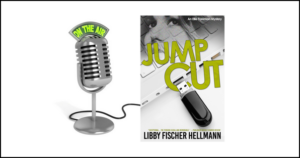 I’ve finally managed to do the interview I’ve always wanted to about the issues, research, and thinking that went into my book Jump Cut. It’s all thanks to my Blog Talk Radio colleague Alex Dolan , author of The Euthanist and The Empress of Tempera. He’s also the host of the ‘Thrill Seekers’ Authors on the Air program, and he invited me onto the show.
I’ve finally managed to do the interview I’ve always wanted to about the issues, research, and thinking that went into my book Jump Cut. It’s all thanks to my Blog Talk Radio colleague Alex Dolan , author of The Euthanist and The Empress of Tempera. He’s also the host of the ‘Thrill Seekers’ Authors on the Air program, and he invited me onto the show.
You can hear the whole thing right here, but if you’d like an annotated version, read on.
Ellie Foreman, politics, espionage and the state of the nation
We first talked about my Ellie Foreman mysteries, exploring why and how a Chicago video producer could find herself involved in espionage. Covering the ten year gap between my last Ellie book and Jump Cut, we looked at using the intimate first person voice to get into a character’s internal perspective, pin down their point of view, and find credible reasons for her to get involved in a murder.
Then we delved into Edward Snowden’s assertion that the US government has more potential to surveil us than we can imagine. And while there’s no reward for being a whistleblower, at the same time, I’ll wager Snowden never expected to become a virtual prisoner in Moscow.
If he comes home now, he’ll be labelled a traitor and prosecuted by secret trial, and our government can do what it wants with him – he will never be free. However, I believe he should be pardoned because he initiated a dialogue we didn’t know we needed to have. In fact, it’s probably the most important dialogue of the 21st century. An articulate and smart guy, his motivations were honorable: he wanted us to know what our government is and is capable of doing, so we can make informed choices about our civil rights.
All this aside, I tried not to take political sides in Jump Cut. I did my best to stay objective. Liberal Ellie doesn’t get everything she wants. She ends up where she started out, but wiser.
We talked about how Jump Cut (hopefully) shows a deep understanding of complex global dynamics (thanks Alex, for the vote of confidence). The dysfunctional relationship between the US and China plays into the plot, a conundrum from both sides that’s made more complicated by our mutual interdependence. China owns huge amounts of US debt. If they call it in we’re in deep shit. But they operate widespread state funded hacking. They oppress their ethnic minorities, especially the Muslim Uyghurs, treating them as terrorists. Unfortunately, the US has co-operated in one or two drone strikes in Uyghur territory organized by the Chinese.
Touching on my favorite subject (and Alex’s): history, we explored how humankind keeps making the same mistakes time after time. The pattern of war…from Korea and Vietnam, to Afghanistan and Iraq, even though they do little except contribute to military coffers. Revolutions have a pattern too: Discontent leads to rebellion, governments are overthrown, dictators are kicked out, but their replacements are often just as repressive, or simply chaotic, like Somalia, Egypt, and Libya. It’s both fascinating and terrifying.
We explored my attitude to research, born back in the days when I worked in journalism, particularly on the broadcast of the Watergate hearings at night. As a news junkie, I also listened to them throughout the day, and the immersive experience laid down a lifetime’s fascination with the reasons behind why things happen. We talked about the changes in journalism (if you can still call it that) in the 24/7 news cycle. On the other hand, I still subscribe to the Washington Post, New York Times and Wall Street Journal. They’re all still doing great journalism, as is Bill Moyers.
We touched on Sisters in Crime, an influential organization with 3500 members, whose objectives are to develop the voice of female mystery authors. Which still needs more balance. One 25 year project of theirs reveals reviews are still majoring on 75% male authors. It could be because reviewers don’t like reviewing ‘cozy’ thrillers, which are the landscape many female thrillers still operate in.
I talked about how much I like the refreshingly raw Scandanavian noir novels, and how I’m a Danish TV junkie.
How it feels to finally get my feelings out there
As experiences go, it was satisfying. I could FINALLY outline my thinking on the issues I wrote about – not political issues per se but current events, and why it’s important to know about them. Now it’s off my chest I can relax and enjoy writing my next book.
And now, you know more about me than you probably ever wanted to know. But if you’d still like more, here are some links to browse:
• Can you revive a series ten years later?
• Jump Cut: A preview
• A tour of Jump Cut locations
• The Invisible Uyghurs
• The Deep State two years later
• About Edward Snowden
And for light entertainment (ha) you can hear my interview with Danish author Sarah Blaedel, the queen of Danish crime fiction
Catch up with Alex Dolan’s new book The Empress of Tempera
Thanks again, Alex. His new book, The Empress of Tempera, is coming out on September 13th. You can pre-order your copy now via Goodreads, Amazon, Barnes & Noble or Indie Bound. Check him out!
The post Getting it off my Chest – The Jump Cut Interview appeared first on .
August 7, 2016
5 Great Books That Were Movie Stinkers
I’m taking an online course with Aaron Sorkin this summer (oh joy!), and for a change, I’m trying to wrap my head around films, as opposed to books, and what makes a great screenplay. (Hint: It’s not these).
How many times have you loved the book but hated the film? Some people swear books are always better than their celluloid counterparts. Others are on the fence, liking some films-to-books and hating others. But a little research reveals a handful of films that are widely acknowledged to be total stinkers. Here are five of them.
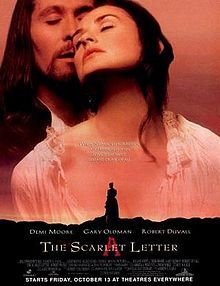 The Scarlet Letter – 1995
The Scarlet Letter – 1995
Nathaniel Hawthorne’s 1850 masterpiece The Scarlet Letter: A Romance was ‘freely adapted’ into a movie that more or less made the critics weep, it was so bad. It’s quite a feat to transform a literary classic into a box office bomb, and Demi Moore and Gary Oldman must rue the day they agreed to it.
The 1995 film The Scarlet Letter is widely cited as the worst film adaptation ever made, and enjoyed the dubious honor of a Razzie award for the most terrible movie of the year. The film’s makers even added a happy ending, which probably saw Hawthorne spinning in his grave. But there’s more. They changed the start, middle and essence of the film, transforming an exceptional book into something utterly nonsensical.
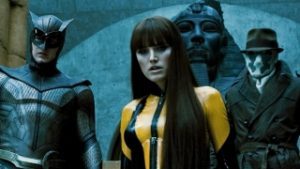 Watchmen – 2009
Watchmen – 2009
In the mid 1980s Alan Moore and Dave Gibbons’ ground-breaking graphic novel was celebrated as one of Time magazine’s top 100, a fantastic masterpiece blending noir, dystopian fiction and superhero culture. It was a huge commercial success and enjoyed widespread critical acclaim, lauded as one of the most significant works of 20th-century literature. Then came Zach Snyder’s 2009 adaptation. Even Author Moore has openly expressed his hatred for the film version, telling the LA Times he was ‘spitting venom all over it’, not having given his permission for the film adaptation in the first place. The critics agreed, and the movie flopped spectacularly.
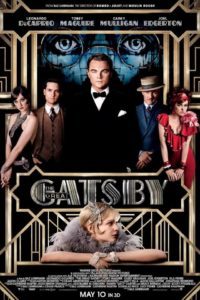 The Great Gatsby – 2013
The Great Gatsby – 2013
As anyone who has read F. Scott Fitzgerald’s subtle, many-layered novel can imagine, it was never an easy task translating it into film. The Robert Redford/Mia Farrow version wasn’t bad, but Leo…I’m sorry to say the glittering 2013 adaptation made by Bax Luhrman missed by a mile. Performances were wooden, the “carelessness” of wealth was absent, and the poignancy woven into Fitzgerald’s classic with Gatsby’s awareness of what a failure he was just isn’t apparent. The result is a grand spectacle of a movie without any heart.
Fitzgerald would not be a happy man. As CNN’s critic Tom Charity said, “There are no two ways about it: The Great Gatsby is misconceived and misjudged, a crude burlesque on what’s probably American literature’s most precious jewel.”
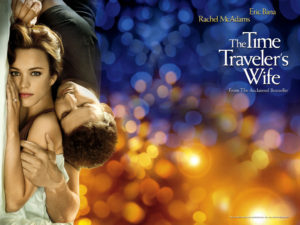 The Time Traveller’s Wife – 2009
The Time Traveller’s Wife – 2009
Maybe it’s because the book is so complicated and multi-layered; but the film of The Time Traveller’s Wife failed big time, missing out on the book’s powerful secondary characters and losing the plot on the hugely complex time travel side of things. The book is elegant, and without that elegance the plot seems illogical and the premise not credible. The fact that the film tries to cram too much action into the available time didn’t do the novel any favors at all.
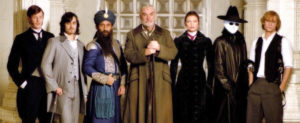 The League of Extraordinary Gentlemen – 2003
The League of Extraordinary Gentlemen – 2003
20th Century Fox had a big fail on their hands with The League of Extraordinary Gentlemen. Alan Moore, who wrote the brilliant original comic strip, refuses to acknowledge it (again) because it’s so bad. Actor Sean Connery fled the acting world for good after the worst reviews of his career. And the unfortunate director, Stephen Norrington, never directed again.
The film grossed more than $175 million worldwide and was supposed to result in a lucrative film franchise, but it never happened. Even the Chicago Sun-Times gave it one out of four stars, saying that it, “plunges into … inexplicable motivations, causes without effects, effects without causes, and general lunacy.”
Which wins for you – The book or the film?
What do you think about the whole novel-movie thing? Have you ever seen a real stinker of a film version, or loved a brilliant film that made the original book look terrible?
The post 5 Great Books That Were Movie Stinkers appeared first on .
July 25, 2016
A Trump-Inspired Literary Tsunami
It’s not unusual. But this time around the literary circus surrounding the 2016 election is unprecedented. And that includes books about the most controversial political figure of our lifetime. Trump’s personal manifesto alone, ‘Crippled America: How to Make America Great Again‘, sold 235,000 hardcover copies in just eight months. In addition, a raft of old Trump biographies have been resurrected to meet demand. And there’s a load of new work in the pipeline examining the man from a host of creative and overwhelmingly hostile angles. In fact, an Amazon search for ‘Trump’ books came up with 5,081 results. Really. Here are just some of them.
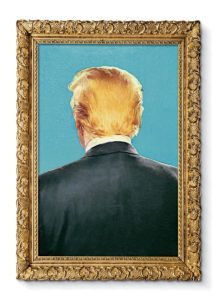 The Art of the Deal by Tony Schwartz
The Art of the Deal by Tony Schwartz
Of course, we have to start with this one, which, although purporting to be authored by Trump, was entirely ghost-written by Tony Schwartz . Schwartz recently told the New Yorker, that, in retrospect, the man has no attention span, and is a classic narcissist, not to mention sociopath. He wrote the book almost twenty years ago. It became a best-seller and he made a LOT of money from it. Now, though, he regrets it all. Of course, the Donald has sued him.
The rise and rise of Trump – ‘The Day of the Donald’
‘The Day of the Donald’, by NYT bestselling author Andrew Shaffer, is a faux thriller 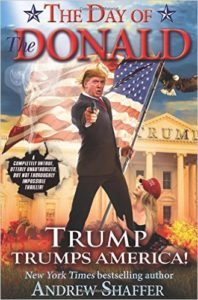 billed as ‘completely untrue, utterly unauthorized, but not thoroughly impossible.’ The Washington Post described it as, ‘A clever spoof that, depending on your politics, will make you laugh or cry…The Day of the Donald perfectly channels Donald Trump’s voice, rhetoric and ego.”
billed as ‘completely untrue, utterly unauthorized, but not thoroughly impossible.’ The Washington Post described it as, ‘A clever spoof that, depending on your politics, will make you laugh or cry…The Day of the Donald perfectly channels Donald Trump’s voice, rhetoric and ego.”
It’s the summer of 2018, and President Donald J. Trump is in office. The Great Wall of Mexico is well under way, funded by Mexico. Folk have more money thanks to lower taxes and a series of ‘creative’ tactics to raise money. While some call the President a despot, the American people love the way he bullies Congress.
When Trump’s original biographer turns up dead, Jimmie Bernwood, the man who published the infamous Ted Cruz sex tape, takes his place. He gets down and dirty with genuine investigative reporting to solve a run of grisly murders, on a mission to ultimately save the nation. The results are both hilarious and terrifying, a disturbing combination and a little too close to the truth for comfort.
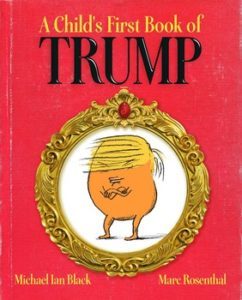 Micheal Ian Black’s ‘A Child’s First Book of Trump’
Micheal Ian Black’s ‘A Child’s First Book of Trump’
What do kids think about Trump? Comedian Michael Ian Black has written a brilliantly funny parody of a children’s book about the American Trumpus, a strange creature you might spot running around in the wild during the election season.
The New York Times bestselling author and comedian invents the bombastic, swaggering Trumpus, an animal with bright orange skin, a plump figure, complex all-enveloping fur and underdeveloped hands. Crafted in his well-loved picture book style, and peppered with wit, Black explores the Trumpus and its ‘mystifying campaign for world domination’.
M G Anthony’s The Trump Coloring Book
As the old adage goes, “You have to laugh, or else you’ll cry”. If you’re in despair over the 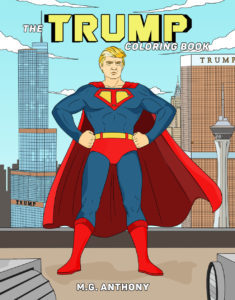 whole crazy Trump-fest, console yourself with a therapeutic coloring-in session. M G Anthony’s fabulous ‘Trump Coloring Book’ is just the ticket. As Amazon says, ‘Whether he’s crossing the Delaware or playing chess with Putin, see Donald Trump like you’ve never seen him before! Over 50 drawings of Trump for you to color—any way you want!’
whole crazy Trump-fest, console yourself with a therapeutic coloring-in session. M G Anthony’s fabulous ‘Trump Coloring Book’ is just the ticket. As Amazon says, ‘Whether he’s crossing the Delaware or playing chess with Putin, see Donald Trump like you’ve never seen him before! Over 50 drawings of Trump for you to color—any way you want!’
August’s release of The Making of Donald Trump
There’s serious stuff out there too. If you find yourself fascinated by Trump, albeit in a horrified kind of way, there’s plenty to learn. Publisher Melville House is set to launch ‘The Making of Donald Trump‘ thanks to David Cay Johnston, the Pulitzer Prize-winning investigative reporter. The book examines Trump’s extraordinary real estate triumph and explosive entry into to politics, a meticulously researched, fact-filled feast of detail painstakingly stitched together from decades of material, including interviews, legal records and financial information.
A new take on old titles – TrumpNation: The Art of Being the Donald
Timothy O’Brien’s 2005 book ‘TrumpNation: The Art of Being The Donald’ got him hit by a five billion dollar lawsuit, although the author was not found guilty of defamation. After the candidacy was announced, O’Brien contacted them about updating the paperback and digital editions. Publisher, Grand Central Publishing, was skeptical at first, but when Trump exploded onto the political scene in the primaries, they updated the book with new details about his finances and a fresh introduction by the author.
Other books also deserve a come-back, like the out-of-print 1993 unauthorized Trump biography by Harry Hurt 111, ‘Lost Tycoon: The Many Lives of Donald J. Trump‘, a blistering expose of his personal life and financial troubles. The publisher declined to republish in case of a lawsuit, and the rights were returned to the author. An original copy could cost you as much as $350 on Amazon. But Echo Point Books & Media, a Vermont publisher, is running a Kickstarter campaign for $5,000 to fund a short print run of the book, being touted as, ‘The book that Donald Trump doesn’t want you to read’.
The last word goes to Mr. Hurt, who hopes the book will get funded and printed soon. In his words, “Time’s a wasting. Hopefully this time next year, nobody will want to read about Donald Trump.”
We can only hope.
The post A Trump-Inspired Literary Tsunami appeared first on .
July 11, 2016
FRAMED: Why Michael Skakel Spent Over a Decade in Prison For A Murder He Didn’t Commit
Note: If you know about this case, I hope you will keep an open mind and read on.
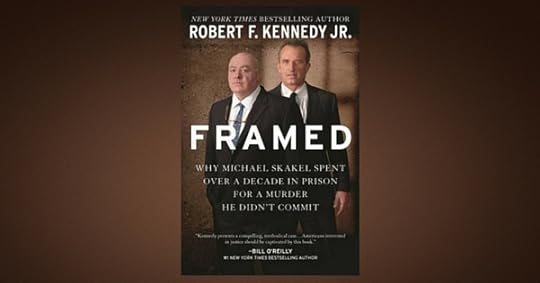
Tuesday, July 12, 2016, is the on-sale day for a true crime book written by Robert Kennedy, Jr. As some of you know, Michael Skakel and Bobby Kennedy, Jr. are first cousins. Michael’s late father “Bucky” and Bobby’s mother, Ethel Kennedy, were brother and sister. But probably just as many of you are young enough to have NEVER heard about this crime. Here’s the 411, which I’ve taken from the book description (the parentheses are mine):
On Halloween 1975, Martha Moxley (she was 15 years old) was found brutally murdered outside her home in swanky Greenwich, Connecticut. Twenty-seven (yes, that’s right… 27) years after her death, the State of Connecticut spent some $25 million to convict her friend and neighbor, Michael Skakel, of the murder. At Michael’s criminal trial, the State offered no physical or forensic evidence, no fingerprints or DNA, no eyewitness linking Michael to the killing. The trial ignited a media firestorm that transfixed the nation. ( Btw, Mark Fuhrman, of the OJ Simpson trial, was intimately involved in the case… who knows why.)
Now, Skakel’s cousin, acclaimed attorney and award-winning writer Robert F. Kennedy Jr. solves the baffling whodunit and clears his cousin’s name.
Kennedy, with meticulous research and reporting, proves that Michael Skakel did not and could not have murdered Martha Moxley. He chronicles how Skakel was, nevertheless, railroaded amidst a media frenzy by the devious actions of a crooked cop, a trio of mendacious writers, a treacherous family lawyer nursing a secret grudge, a narcissistic defense attorney obsessed by the spotlight, a craven prosecutor gone rogue, and a parade of perjuring witnesses. These colorful characters leap off the pages like seedy villains in a dime-store crime novel… But it’s all true.
Why am I bringing this up? If you’re a crime thriller writer or reader, you might be interested that I was asked to read an advance copy of the book for a review blurb, which appears on the back cover of the dust jacket. (The story of how that happened is worth a blog post of its own… sometime.) The blurb I wrote was shortened, but here’s the entire thing:
Crime thrillers and true crime stories, while quite different, have a similar objective: to show how justice is served. FRAMED by Robert Kennedy Jr. combines the best of both with a powerful story that grabbed me in the first few pages and wouldn’t let go. Kennedy meticulously torpedoes the case that convicted his cousin Michael Skakel of murder by painting a decades-long horror show of incompetence, prejudice, malfeasance, and outright misconduct. What I didn’t expect, though, were the feelings that surfaced while I was reading. Kennedy took me from rage to tears at the injustices suffered by his cousin and family. FRAMED is a must-read for anyone who cares about our judicial system.
Now, I do realize that practically no one in the world is neutral about the Kennedy family. But before the cynics among you jump all over me, read this blurb from Bill O’Reilly:
“Kennedy presents a compelling, methodical case… Americans interested in justice should be captivated by this book.”
Although I am old enough to remember the crime and the prosecution of it, I was literally blown away by the story. This is an important book; it was published by Skyhorse Publishing. I hope you will read it.
The post FRAMED: Why Michael Skakel Spent Over a Decade in Prison For A Murder He Didn’t Commit appeared first on .
June 22, 2016
“Digital Fatigue” or Chutzpah?
 A blog post on Publishers Weekly recently claims that “digital fatigue” is making ebooks less appealing, and, as a result, fewer of us are buying them.
A blog post on Publishers Weekly recently claims that “digital fatigue” is making ebooks less appealing, and, as a result, fewer of us are buying them.
Huh?
What is “digital fatigue?” According to the author of the PW article, the phrase was coined by Codex president Peter Hildick-Smith who believes this is a new consumer phenomenon. His research claims that the current range of ebook reading devices, from smartphones to tablets, tablets and dedicated ereaders, has failed to deliver a popular enough long term alternative to the printed book.
Their study reveals 34% of book buying households own an ebook reader, used for 55% of the total time spent reading. Ereader owners were responsible for 59% of ebooks bought by those who took the survey. 66% of book buying homes own a tablet, but they’re only used for for 28% of total ebook reading time. 73% of book buying households own smartphones, but – not surprisingly since the screens are so small – they only account for 12% of e-book reading time. The survey also found that 25% of book buyers want to spend less time on their digital devices.
A search on Google for ‘evidence for digital fatigue’ delivers little reliable information about the phenomenon. There are no ‘scholarly articles’ about it. There is an eContent article dating back to 2013, which suggests the digital generation is starting to show a keen interest in traditional, non-digital reality.
And Ann Mack, director of trendspotting at J Walter Thompson, says that JWT started following the revival of analog back in 2010 or 2011 based on a trend they identified as de-teching.
“As our dependency on technology rises so too will our desire to dial it down, at least temporarily, so we can be present in the offline now, and see people face to face and engage with them in reality rather than in virtual reality.”
A post on the alphabeatic website also mentions digital fatigue, albeit briefly, saying, “There are many reasons why e-books are better than their print counterparts, but there’s also one big way in which they aren’t – they require screens, which many people otherwise look at all day.” They predict a widespread return to non-digital pastimes.
But does that indicate a digital downturn? The absence of research proving some sort of anti-digital revolution is taking place, tells me that “digital fatigue” as it applies to reading is merely supposition, not fact.
The Chutzpah factor
In fact, I’d say that the theory of digital fatigue, as it applies to reading, indicates a lot of chutzpah. While I grant that some dream of spending less time on digital devices –Retro-hippies anyone?— but as it pertains to reading, the theory doesn’t hold water. Mostly because the statistics are incomplete. Yes, ebook sales from traditional publishers have decreased, but that’s mostly because the Big Five have raised their ebook prices so much that there’s little difference between digital and print editions. At the same time, the statistics fail to count all the indie authors who are continuing to publish and sell books at a healthy rate.
I prefer to follow Author Earnings, Data Guy and Hugh Howey’s quarterly estimates, which continue to show a brisk rise in earnings for Indie Authors. In fact, Author Earnings report that the Big Five are seeing the error of their high-priced ways and have actually started to lower their ebook prices. I wonder what that will do to the statistics in the 3rd and 4th quarter of 2016.
What does common sense say?
Common sense says once people get used to a new device, they’re less excited by it. Logic says there must be a saturation point for e-readers, where every household owns at least one and the household’s readers have all the tech they need to engage with ebooks.
But do we get TV fatigue, radio fatigue, magazine fatigue, printed book fatigue or film fatigue?
Hardly. Radio didn’t kill the theatre. Video didn’t kill TV. DVDs didn’t kill cinema. And TV didn’t kill books. By the same token, digital book consumption won’t kill off the printed book, or vice versa. All new tech does is add another layer of choice for consumers.
Look at things that way and ebooks are simply being integrated into the normal way of doing things – not an activity that’s being discarded by the reading public. It’s much more likely that things are merely finding their natural balance.
Your turn. What do you think?
The post “Digital Fatigue” or Chutzpah? appeared first on .
June 21, 2016
How 3 Audiobook Narrators Choose Their Books

How audiobooks narrators choose their books
(Updated: Originally published in November, 2013)
Thanks largely to Amazon and Audible.com (which it owns), audiobooks are quickly changing the way we “read.” Yes, I’m a book addict, but there’s just not enough time in the day for me to escape with a great story. So I make time. When I’m in the car, walking the dog, or cleaning the house, I now listen to audiobooks. In fact, audio is fast becoming my first “go-to” read.
As an author, I’ve produced audios of all my books and creating them has been fascinating… and fun. The most important decision is, of course, who or what kind of voice should narrate the story. Should it be a man or a woman? Should the woman’s voice be melodic and bouncy? Or alto and sultry? What about diction? Accent? Inflection? As a producer, I decide all that in advance.
As many of you already know, ACX has made it easy for producers and narrators to discover each other, and I’ve found some wonderful narrators. And while I’ve written about audio before, this time I wanted to give you a peek “behind the curtain,” so to speak, and let you see how three of them approach the job of narrating a book. Btw, I’ve loved working with all of them—they are true professionals. And, as it turns out, their responses are fascinating.
Meet Diane Piron-Gelman, Robin Rowan and Karyn O’Bryant. I couldn’t do what I do without them.
What do you look for in a book that you’re considering recording? What turns you on… and what’s an automatic “no?”
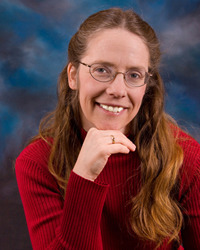 Diane: I look first at the quality of the writing. Language has sound and rhythm, texture and shape; if those elements aren’t there as I read, the book isn’t for me. If I can hear the characters talking in my head, I know the narration will go well.
Diane: I look first at the quality of the writing. Language has sound and rhythm, texture and shape; if those elements aren’t there as I read, the book isn’t for me. If I can hear the characters talking in my head, I know the narration will go well.
Clumsy, clunky prose that makes the mental “ear” as well as the tongue stumble is a huge turn-off. Bad dialogue is another. I’d rather not have to suppress snorts of laughter while I’m trying to deliver a poorly written or really cheesy line and make it sound brilliant.
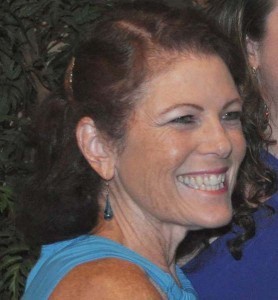 Robin: What I look for in a book is something meaty, something substantive that I can really get excited about. If you’re not excited about the book, you won’t do a good job. As a voice for commercials and also a former ad agency copywriter, I always followed the great ad man David Ogilvy’s advice: You have to believe that the product you’re selling (or the book you’re narrating) is the absolute greatest product (book) in the world. I think mystery/thrillers are my very favorite type of book, since that’s the type I would pick up and read myself. Ones to steer away from? I would accept any genre, but it is easy to tell in the audition script if the book is not well written, or if it is a page-turner.
Robin: What I look for in a book is something meaty, something substantive that I can really get excited about. If you’re not excited about the book, you won’t do a good job. As a voice for commercials and also a former ad agency copywriter, I always followed the great ad man David Ogilvy’s advice: You have to believe that the product you’re selling (or the book you’re narrating) is the absolute greatest product (book) in the world. I think mystery/thrillers are my very favorite type of book, since that’s the type I would pick up and read myself. Ones to steer away from? I would accept any genre, but it is easy to tell in the audition script if the book is not well written, or if it is a page-turner.
Karyn: I look for an interesting story. I also look for fair compensation for my work.
How do you prepare to narrate a book?
Diane: First, I read the whole thing. This lets me know the basics that affect how I voice each character: gender, age, where they grew up, whether they have a distinct accent or mode of speaking, that kind of thing. Is the character a hard-bitten, world-weary type? A sheltered twenty-something? A warm-hearted, bubbly person who spreads cheer wherever she goes?
Also, what’s going on with each character in each scene—are they excited, afraid, angry, joyful, falling in love, mourning a loss? All of these things color how I read them, whether we’re talking dialogue or internal POV.
I note what to look up for pronunciation. I also make notes about each character and practice vocalizations that to me express who each character is. If I get a character’s voice in my ear, I can think myself into his or her head-space, and then the reading flows naturally.
Robin: I don’t read the entire book before I begin narrating. Maybe some narrators do, but I just dive right in. I have a good feel for the story beforehand and at least know who the main characters are and how I will portray them. My husband knows that I am in “audiobook” mode when I spend 10 hour days in the studio and he doesn’t see me except for dinner for weeks at a time.
Even while I am away from the studio, I’m thinking about the characters, or perhaps I’m deciding to change something along the way. I remember getting to Chapter 21 in a 14-hour book and completely changing one of the characters. That meant going back and finding EVERY line spoken by her and editing it into the chapters. But you know what? I like to find out what happens as I go, just like a listener would.
Karyn: I read the book and take notes on each of the characters. I also look up any word that I’m not 100% sure of how to pronounce. Occasionally, I’ll chat with the author to get a better insight into the tone/style of the piece and extra character clues.
What’s the hardest part? The easiest? What about editing?
Diane: Some days, the hardest part is getting through a particular sentence without fluffing. Or getting through a highly emotional moment for a character without overdoing volume or enunciation and sending the recording meter into orange or red.
Another challenge is being able to spend several hours in the booth without background noise intruding: airplanes, garbage trucks, house noises like the refrigerator. It can also be hard to keep still so my mic doesn’t pick up chair creaks.
The easiest part is the acting. Narrating is an acting job, though you’re not playing to a 900-seat proscenium theatre. It’s more like TV or movies, the vocal equivalent of being in permanent close-up. A slight shading in tone can convey a whole new emotion, and a little bit goes a very long way.
Thus far, I’ve done minimal editing, as I’m still learning to use the extremely complicated ProTools software. In general, each finished hour I record represents roughly 2 ½ to 3 hours of work, not including text prep.
Robin: The most difficult part of narrating is coming across a character with an accent you’ve never tried before, or in one case, a French Canadian man who only spoke French. Sometimes for accents with which I’m unfamiliar, I go to YouTube and type in Charles de Gaulle to listen to his French, or Barbara Streisand for a Brooklyn accent.
Editing takes the most time, but is not the most difficult. I spend about 4 hours per every finished hour recording, editing, and then going back and proofreading with the audio. Narrators get intimately involved with every book, and sometimes it’s sad to say goodbye to a character you particularly loved to portray.
I always have the listener in mind. If I’m going to sit down and listen to someone’s voice for 12 or 14 hours, they’d better be pretty darned interesting to listen to, or I can’t get into it. I’m so cognizant of that as I’m recording!
Karyn: The hardest part is the editing. It takes significantly longer than recording or prep. The easiest part is the narration. It is enjoyable, and with good writing, the characters practically narrate themselves.
What tricks do you use to keep your voice going?
Diane: I have a water bottle on hand, make sure to do breathing warm-ups, and I keep a bowl of grapes nearby so I can pop one every now and again. Some narrators swear by green apple slices, but they don’t work for me.
Robin: I can keep recording for about 4 hours max per day before the quality of my voice changes and I have to stop. I swear by Milo’s sweet tea in the studio, because they use corn syrup, and it’s kind of “slickery” and good on the throat.
I keep my lips “lubed” with a “Kiss My Face” product, since it is almost liquid and helps with mouth noise. Apples slices are wonderful for helping with the mouth noise as well. You’d be amazed at what you can hear in those headphones!
Karyn: Regular vocal exercises, lots of water, not a lot of booze or caffeine, and throat spray.
Where do you see yourself in 10 years? Still recording?
Diane: I would love to still be recording in 10 years, hopefully with a large enough body of work that I can command finished-hour rates that are double or more what I make now. What other job is there in the world that pays you to pretend to be other people?
Robin: I’ve been narrating books since 2009 and have finally found my niche. I have never had so much fun at any job in my life, and there’s absolutely no reason why I can’t keep doing it until I’m well into my 80s. How wonderful is it to wake up every morning, looking forward to immersing myself in a great book? There’s nothing like it.
Karyn: I honestly don’t know what the next 10 years will hold, just as I could not have imagined 10 years ago that I would be where I am today. I would love to continue to be involved in voiceover and audiobooks. It is all an adventure, and it’s a delight to experience its unfolding.
So, there you have it. Btw, Diane recorded 3 of my novels:

Set The Night On Fire – political thriller

A Bitter Veil – historical romance/suspense

Havana Lost – historical novel spanning generations
Robin has done two plus a lot of my short stories:

Image of Death – suspense thriller

Toxicity – suspense thriller
And Karyn voiced the first audio I did myself:

Eye for Murder – suspense thriller
The post How 3 Audiobook Narrators Choose Their Books appeared first on .

